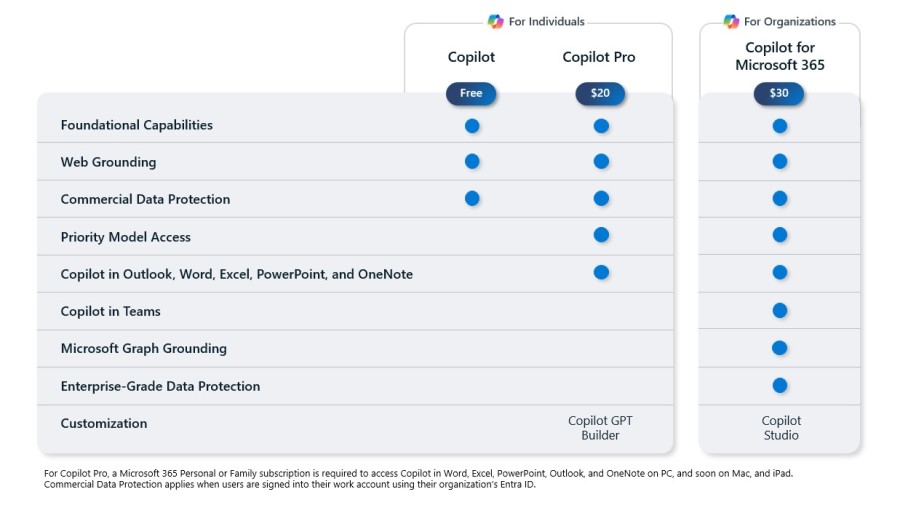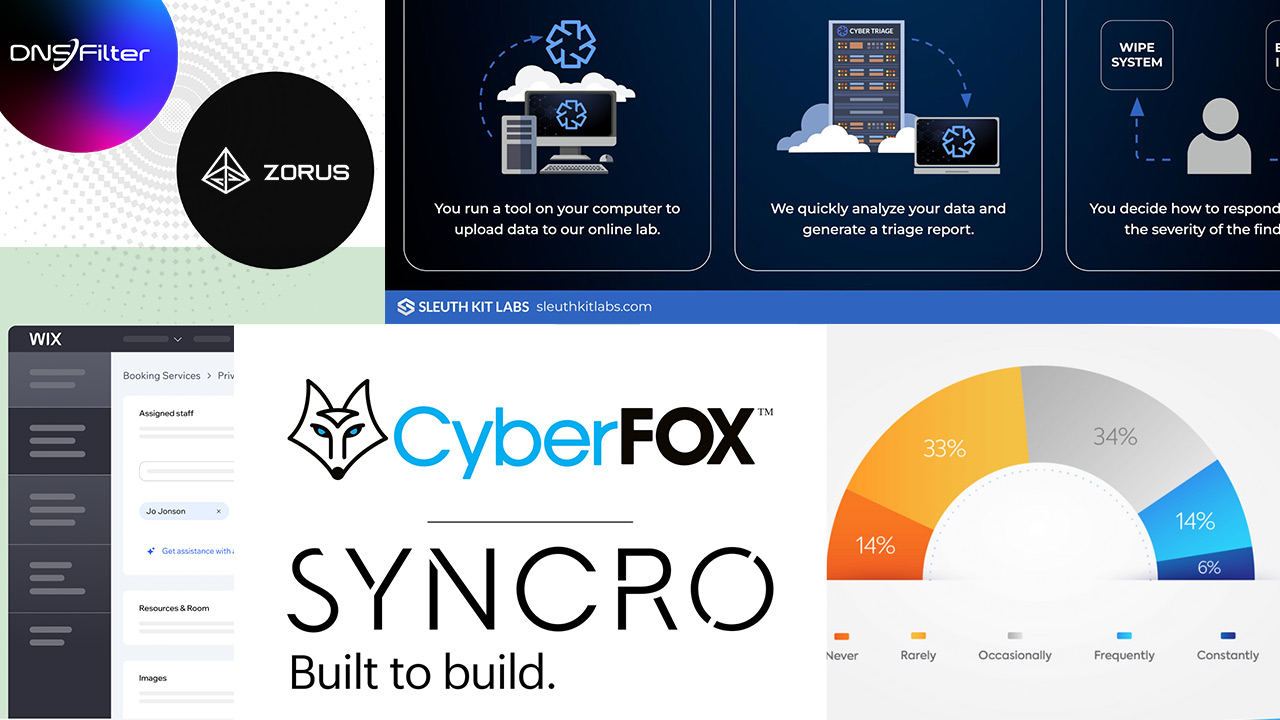Microsoft in fall 2023 introduced Copilot for Microsoft 365, but limited its adoption to those larger than 300 seats and specific enterprise licenses. Those requirements have finally been lifted, making Copilot for Microsoft 365 generally available to businesses of all sizes. The question becomes: is Copilot a moneymaking opportunity for MSPs?
While artificial intelligence, in the form of large language models, has dominated headlines for the past year and sparked significant change to work and personal life, integrating AI into large productivity suites could become the largest driver of change businesses have seen since the modern internet. Therefore, MSPs need to be ready to guide their customers and capitalize on the opportunity it presents.
To get a handle on Copilot, its impact, potential pitfalls, and other questions, I turned to a panel of industry experts:
- Geoff Bibby is senior vice president of OpenText Cybersecurity and has a 20-year relationship with Microsoft through OpenText Cybersecurity’s solutions like Zix and AppRiver. He also was the first North American reseller for Microsoft 365.
- Corey Kirkendoll, president and CEO of 5K Technical Services and ChannelPro Advisory Group member, brings 27 years of experience in the information services.
- Lawrence Cruciana, president of Corporate Information Technologies and also a ChannelPro Advisory Group member, is a recognized authority in risk management and cybersecurity.
What is Copilot for Microsoft 365, and What Makes it Different than Other LLMs?

Geoff Bibby
Bibby described Microsoft 365 Copilot as “a family of copilots.”
“Copilot is an AI chatbot that uses the latest generative AI models. What makes Copilot unique is that it uses GPT-4 and Dall.E-3, but with commercial data protection which makes it very appealing for businesses. This means your chats are secure, the interactions are never used to train the AI, and your session data is purged between each interaction. These safeguards are huge for businesses.”
The commercial data protection distinction is the critical piece of the puzzle of why MSPs’ customers would want Copilot for 365, but it’s not the only protection it offers over other AI solutions. “Microsoft also provides copyright indemnification for customers to protect themselves from copyright lawsuits,” Bibby noted, important as the ongoing debate and waves of lawsuits from content creators whose work has been used to train AI models rages on.
Kirkendoll agreed with Bibby on the advantages Copilot brings to the table. “The key advantage lies in its seamless integration with the Microsoft Office 365 suite, making it not only user-friendly but also effortlessly adaptable to your business needs. Thanks to this tight integration, you automatically inherit all the Conditional Access policies and security controls established within your Microsoft environment. This level of security surpasses what’s offered by ChatGPT and other AI products right out of the box.”
Getting in Front of Confusion
Microsoft has other iterations of Copilot. There’s a free version built into Windows, a “Pro” level subscription for $20 per month, and the version built into Microsoft 365 for $30 per month, which could lead to confusion as your customers look to adopt AI for their business. What should partners do to get in front of it?

“It is about painting a complete picture for customers; this will help partners get ahead of pricing concerns,” Bibby replied. “For example, if an employee has a fully-laden cost of $70,000 annually, Copilot pays for itself in productivity improvements if it can save that employee just one hour each month — and many early adopters are reporting much more than merely one hour every month.”

Corey Kirkendoll
Focusing solely on the costs during these conversations might obscure the real value proposition, Kirkendoll advised. “It’s essential to emphasize how our solution can streamline operations and boost productivity. While it may entail a higher initial investment, the time saved in document creation and meeting organization will quickly offset the costs, proving its worth.”
Other MSPs who are testing Copilot in their own businesses are seeing similar success. “After using Copilot for a little over a week now in a trial across my team, the surprisingly fast and overwhelmingly deep level of adoption is nothing short of astounding,” said Cruciana. “The single biggest area of improvement/gains has been in clear and articulate communications between technical staff and external non-technical stakeholders (client C-level executives).”
Added Value, not Cost
Pricing for Copilot has been an area of concern for some, given that licenses can cost double or more than the license for Microsoft 365 itself in some cases. Smaller businesses may feel priced out, leaving mid-market and enterprise with a significant advantage. Both Kirkendoll and Bibby emphasized that communicating the value proposition is the best way to overcome objections — and that starts with illustrating the advantages that come with transitioning away from standard licenses.
“It’s prudent for us all to gravitate towards Business Premium licenses and incorporate additional features as required. However, in the long term, there may be a necessity for price adjustments, as it remains challenging to convince smaller SMBs, who are particularly cost-conscious, of the value proposition.”
Leveraging Copilot as a New Opportunity to Bring Value
![]()
Microsoft certainly stands to gain with resellers bringing Copilot to their customers, but selling Microsoft licenses alone isn’t something that will fill an MSPs bank account. “I make big bucks selling just Microsoft 365 licenses!” said no partner ever.
It’s crucial that partners see Copilot as an opportunity to bring a new kind of value to their customers, one that Kirkendoll believes will evolve “into a full-fledged business focused on aiding companies in adopting, implementing, and managing AI in the most effective manner possible, giving them a degree of control.”
Bibby, too, sees Copilot for Microsoft 365 as a catalyst to engage customers in a full 365 audit, looking at everything from security to licensing, bringing additional opportunities. “This is a big moment for partners to really engage more with their customers through education, which can be productized in a repeatable process to get SMBs AI ready.”
Recognizing the opportunity for partners and capitalizing on it is one thing, but it’s important to remember that your customers have just as much if not more to gain, Bibby noted. “Copilot for Microsoft 365 presents a momentous opportunity in the SMB space to significantly improve productivity and quality of work. For many organizations, transitioning to Copilot for Microsoft 365 will be very transformative.”
It’s important to recognize that many customers may be fearful of AI and major transformation, but according to Kirkendoll, not having these conversations could be detrimental. “In a landscape where advancements are rapid, failure to keep pace could result in being left behind, potentially leading to non-existence shortly.”
Turning Risk into Profit
As with any new technology, there are risks and dangers MSPs need to be aware of, and work with your customers to address before giving Copilot total access to a tenant.
“Businesses will be enabling unprecedented access to information; they need to know where their information is stored and who has access to it before enabling full generative AI prompts. Getting customers’ foundational information governance ready is an essential starting point,” said Bibby. Beyond the security requirements, there are fundamental change management and user training requirements that need to be addressed. “Everyone will have their own preferred communication mechanism, the way they ingest information, the first order of business is not to get overwhelmed by trying to rush.”

Lawrence Cruciana
Cruciana concured there’s an urgency and overwhelming importance for data classification, consistency in marking, and how to mark data, which will become a paramount skill in the near future. “The inadvertent placement of data in a tenant is a bigger deal than many SMBs will realize. I expect that we will soon see reports of substantial inadvertent disclosure, compromises in reportable privacy events, etc. Because of that very skill … or lack thereof.”
Or, as Kirkendoll quipped, “I feel like an Urkel Moment coming soon from many SMBs … ‘Did I Do that?’”
Cruciana agreed was a perfect personification of the forthcoming AI-generated airing of dirty laundry and sensitive, confidential information. “This marks the chance for MSPs to extend AI Officer Services, aiding in the development, testing, training, and implementation of optimal AI practices and protocols for their clientele.”
Security awareness training (SAT) — which Bibby described as simple, yet important — is another area in need of change as partners prepare their customers for the on-rush of AI. “SAT needs an overhaul that includes an AI component to get users really thinking about where they put information. Otherwise, even well-intentioned team members may place content in a Teams folder where it wouldn’t normally be expected; it will be found when the index runs. Which brings me to the next point: At the language level, it is critical that employees learn how to use a prompt.”
The experts agreed that much of the risk involved with rolling out Copilot across an organization can be mitigated through thoughtful planning and education, with Kirkendoll highlighting that the synergy between AI and cybersecurity is akin to the synergy of peanut butter and jelly. The opportunity to for partners to leverage security as part of the AI conversation should be “irresistible and highly lucrative when executed in unison.”
“Partners who invest the time to understand what it takes to get AI-ready will play a key role in helping SMBs accelerate their shift to the cloud,” said Bibby.
Copilot Now, and in the Future
Even the very definition of “AI-ready” is constantly changing given the rapid evolution of the technology that’s still in its infancy. The evolution from the third iteration of Chat-GPT to the fourth was immense, and the next iteration expected to debut sometime this year, ChatGPT-5, could be equally as impressive in terms of new capabilities, with some expecting it to achieve a level of artificial general intelligence.
Copilot has “plenty of room to grow,” said Kirkendoll. Like with cybersecurity, partners will need to keep up with AI as it evolves and is integrated into Copilot and other business tools.
While that future is unknown, one thing that is certain is that Copilot and AI present a golden opportunity to bring an entirely new value and services to your customers. Take it, or someone else will.
Image: Adobe and Microsoft













